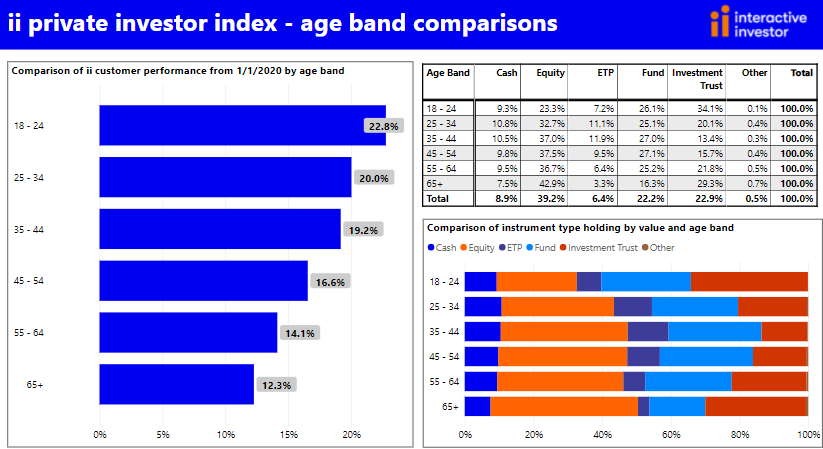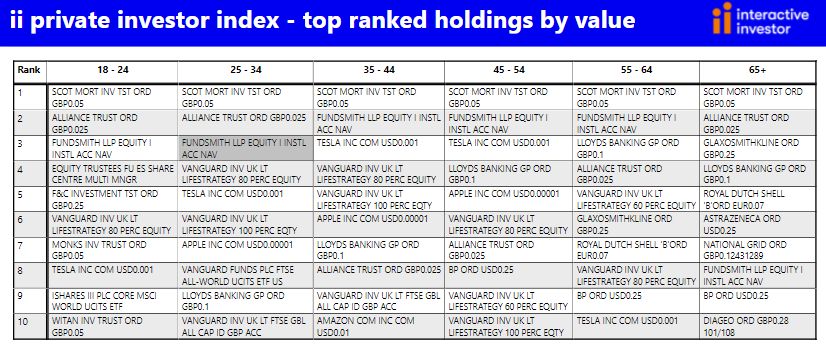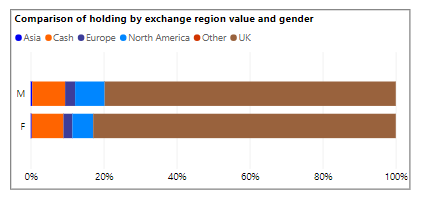Private Investor Index: ii customers beat professional investors in 2021
11th January 2022 09:25
by Jemma Jackson from interactive investor
Figures show that customers are ahead of major UK indices over two years.

- interactive investor’s youngest investors (18-24-year-olds) enjoyed the highest returns over the two-year period, while older customers (65+) performed the best in 2021
- The wealthy (£1m+ accounts) have outperformed all other asset bands over all time periods covered, and are up 23.4% over 2 years (9 percentage points ahead of average ii customer)
interactive investor is the UK’s second-largest investment platform for private investors, approaching £55 billion assets under administration. Its Private Investor Performance index, updated quarterly, is a barometer of how investors are faring, whatever the economic backdrop.
With data now going back two years, the index charts interactive investor’s customer performance data, in median average terms*, since the first coronavirus cases emerged in the UK.
But first, to the past year: the 65+ age category was the best-performing interactive investor age category in 2021, returning 14.6% compared to 13.8% for the average ii customer.
- Invest with ii: Top Investment Funds | Top Investment Trusts | Open a Trading Account
Older customers were likely boosted by more direct equity exposure. Either way, both cohorts beat professional investors hands down, with the IA Mixed Investment 40-85% Shares sector up 11% - well behind the 13.8% for the average ii customer.
But the major UK indices were hard to top, bouncing back from the lows of 2020. The FTSE All-Share and FTSE 100 were up 18.3% and 18.4% respectively in 2021, and the FTSE World Index was up 22.1%.
Young guns go for it
Over the full two-year period, younger investors have enjoyed the highest returns, with 18-24-year-olds leading the pack, up 22.8%, with 25-34 and 35-44-year-olds not far behind. The secret sauce appears to have been a higher-than-average allocation to investment trusts.
The average interactive investor customer portfolio, in median average terms, returned 14.5% over the past two years that has coincided with the pandemic. This lags the Investment Association’s (IA) Mixed Investment 40-85% shares sector (17.2%) and of the FTSE World Index (37.6%) over the same period. However, it beats the return of the FTSE All-Share (6.7%) and the FTSE 100 (4.8%), over two years.
Richard Wilson, CEO, interactive investor, says: “It’s encouraging to see that our customers have managed to navigate the ongoing market uncertainty since the start of the pandemic in 2020. Over the 24 months of data collected, our customers have outperformed both the FTSE 100 and FTSE All-Share, and our younger investors have demonstrated a particularly impressive performance, helping to pave the way for their longer-term financial security.
“Now that we have two years of data, we have a much fuller picture of how our customers have been faring, and even thriving, in what have been challenging conditions for many.”
Young investors lead the way
Private investors in the youngest category, 18–24-year-olds, significantly outperformed their older counterparts over the 24-month period, returning 22.8%. Their higher-than-average investment trust exposure continues to serve them well to date (34% versus an overall average of 23%).
This was closely followed by the 25-34 age group, which returned 20.0% over the same period, and 35-44-year-olds (up 19.2%).
Older investors (65+), by comparison, returned 12.3% over two years, but fared better than younger investors in Q4 alone – returning 2.8%, compared to 2.3% (investors in the 18-24 category).

Top holdings
Scottish Mortgage (LSE:SMT), Alliance Trust (LSE:ATST) and Fundsmith Equity remain favourites among all age categories, and each of these featured in the top three holdings in the 18-24 age category over the last 24 months.
In addition, variants of the Vanguard LifeStrategy range featured in the top 10 most-held investments by value across the board – bar those 65+ (on average).
Despite ongoing warnings from the FCA that younger investors have placed too much emphasis on popular technology stocks, which are often perceived as higher risk, the full two years of data does not necessarily reflect this. Aside from Tesla (NASDAQ:TSLA), there is a lack of other tech stocks in the 18-24 age group’s average top 10 holdings over the last 24 months. Amazon (NASDAQ:AMZN) and Apple (NASDAQ:AAPL) both featured in the top 10 holdings for 35-54-year-olds, however. Tesla was a popular holding across the board, and featured in the top 10 holdings for all age groups, apart from customers aged 65+.
Older investors, aged 65+, favoured pharmaceutical stocks such as GlaxoSmithKline (LSE:GSK) and AstraZeneca (LSE:AZN), which both featured in this age group’s top 10 holdings over the last two years. FTSE stocks can also have an income theme.

Wealthiest investors continue to thrive
interactive investor’s wealthiest customers (£1m+) enjoyed the highest returns of all the asset bands over all time periods, reaching 23.4% over the 24-month period, and 14.3% over the last 12 months.
Customers in this category had higher allocation to investment trusts (26.5%) versus 23% for the average ii customer. Investment trusts tend to outperform funds in a rising market, and underperform in a falling market, due to gearing (borrowing). This may have helped this wealthier bracket of investors navigate the two-year period the best.
Gender
ii’s data suggests that over the time frames amassed so far, there is very little difference between male and female customer performance. Portfolios are broadly similar too, with women slightly more inclined to favour investment trusts and slightly less inclined towards direct equities. But the differences are small.
interactive investor now has 120,000 female customers – that’s bigger than some entire platforms.
SEGMENT | RETURN_M24 | RETURN_18M | RETURN_12M | RETURN_9M | RETURN_6M | RETURN_3M |
Female | 14.3% | 10.8% | 13.9% | 10.6% | 4.5% | 2.7% |
Male | 14.2% | 11.2% | 13.7% | 9.7% | 4.1% | 2.4% |


Regional breakdown
interactive investor customers based in the Channel Islands performed best in Q4 2021, up 2.8%. The Channel Islands was also the top-performing region over the full two-year period, with returns of 16.5%. This was closely followed by Scotland, which returned 16.3% over the two years. interactive investor customers in London also performed strongly, with 15.1% returns over the full 24 months.
During 2021, the Channel Islands, East Midlands, and the North East were the three top-performing regions, each returning 14.4%.

Notes to editors
*ii customer performances quoted are median values to avoid the influence of outlier performance skewing the data.
The performance is calculated using the Time Weighted Rate of Return with returns calculated before each money transaction, then the results compounded over the reporting period. The time-weighted rate of return (TWR) is a measure of the compound rate of growth in a portfolio. It eliminates the distorting effects on growth rates created by inflows and outflows of money.
Then median averages are calculated independently for each group we analysed – so that outlier performances did not skew the results.
Index performance, unless otherwise stated, is ii using Morningstar, total return in GBP, to end December 2021.
Portfolio values under £20,000 were stripped out to keep the sample representative of ii’s core customer base.
These articles are provided for information purposes only. Occasionally, an opinion about whether to buy or sell a specific investment may be provided by third parties. The content is not intended to be a personal recommendation to buy or sell any financial instrument or product, or to adopt any investment strategy as it is not provided based on an assessment of your investing knowledge and experience, your financial situation or your investment objectives. The value of your investments, and the income derived from them, may go down as well as up. You may not get back all the money that you invest. The investments referred to in this article may not be suitable for all investors, and if in doubt, an investor should seek advice from a qualified investment adviser.
Full performance can be found on the company or index summary page on the interactive investor website. Simply click on the company's or index name highlighted in the article.